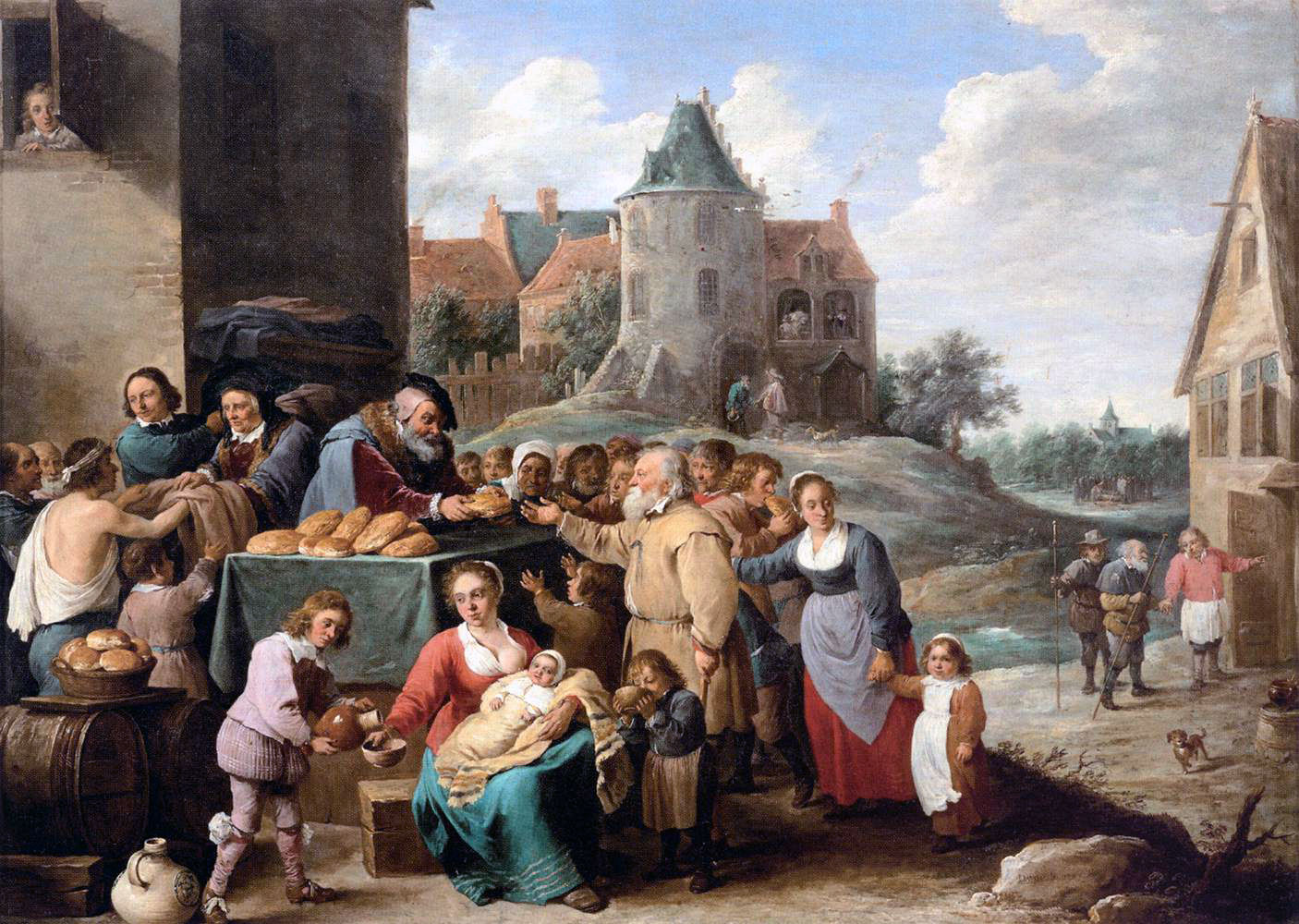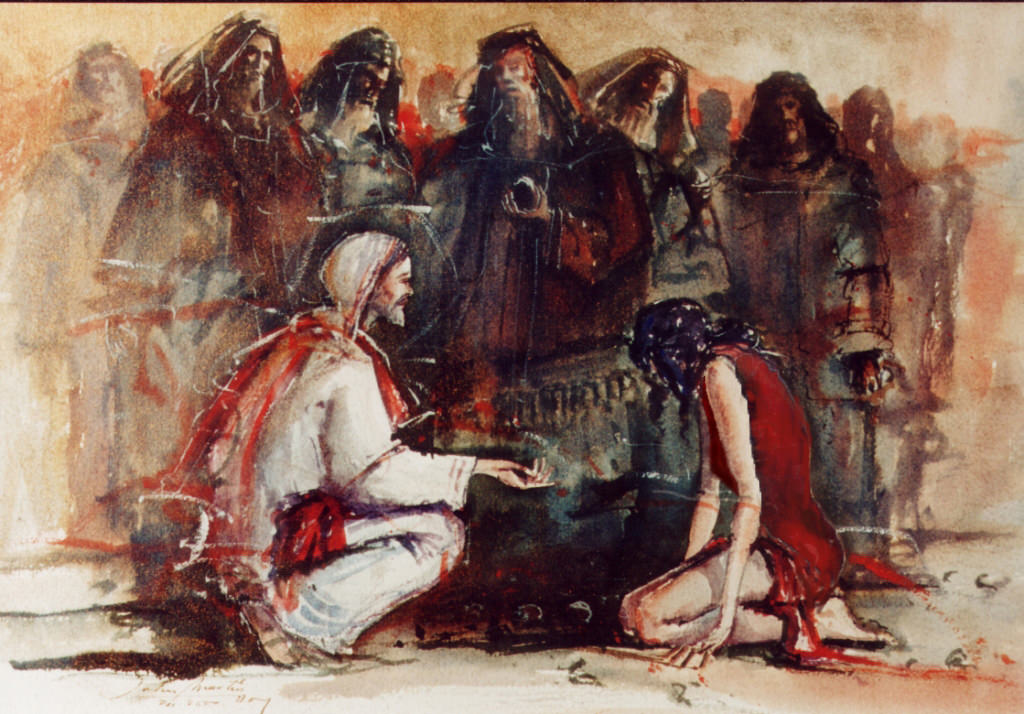The Life of Mercy
Be Merciful
As Your Father is Merciful
We are not only to receive the mercy of God, but to use it by being merciful to others through our actions,
our words, and our prayers; in other words, we are to practice the Corporal and Spiritual Works (Acts) of Mercy.
The Lord wants us to do these works of mercy, because even the strongest faith is of no use without works.
Jesus, I Trust in You!

The Annunciation
Artist Unknown1
What are the Works of Mercy?
Corporal Works of Mercy
- Feed the hungry
- Give drink to the thirsty
- Clothe the naked
- Shelter the homeless
- Comfort the prisoners
- Visit the sick
- Bury the dead
Spiritual Works of Mercy
- Teach the ignorant
- Pray for the living & dead
- Correct sinners
- Counsel those in doubt
- Console the sorrowful
- Bear wrongs patiently
- Forgive wrongs willingly

Works of Mercy
by David the Younger Teniers2
Jesus' Call to Mercy
"I demand from you deeds of mercy, which are to arise out of love for Me. You are to show mercy
to your neighbors always and everywhere. You must not shrink from this or try to excuse or absolve yourself from it.
I am giving you three ways of exercising mercy toward your neighbor:
- By word,
- By deed,
- By prayer.
In these three degrees is contained the fullness of mercy, and it is an unquestionable proof of love
for Me. By this means a soul glorifies and pays reverence to My mercy.
Many souls … are often worried because they do not have the material means with which to carry out
an act of mercy. Yet spiritual mercy, which requires neither permissions nor storehouses, is much more meritorious and is
within the grasp of every soul.
If a soul does not exercise mercy somehow or other, it will not obtain My mercy on the day of judgment.
Oh, if only souls knew how to gather eternal treasure for themselves, they would not be judged, for they would forestall
My judgment with their mercy" (Diary: 1317).
Become the word in body
as well as spirit.

Forgiven
by Greg Olsen3
"Jesus teaches us another way: Go out. Go out and share your testimony, go out and interact with your
brothers, go out and share, go out and ask. Become the word in body as well as spirit." - Pope
Francis
Mercy: The Lord's Strongest Message.
Pope Francis' First Papal Homily

Woman Caught In Adultery (edited)
by John Martin Borg4
The crowd wanted to stone a woman who had committed adultery. Jesus told them "let him among you who is without
sin, cast the first stone" and then told the woman "go and sin no more".
"I think even we are sometimes like these people, who on the one hand want to listen to Jesus, but on the other
hand, sometimes we like to stone others and condemn others. The message of Jesus is this: mercy," he said. "I say in all humility
that this is the strongest message of the Lord: mercy" Francis said, speaking in a soft voice.
"The Lord never tires of forgiving, never! It is we who tire of asking for forgiveness," he said. "Let us ask
for the grace of never tiring of asking for forgiveness because he never tires of forgiving," he
said.
Pope Francis'
First encyclical is on mercy
The first major encyclical by Francis is a Sunday sermon that lasted all but a few minutes. The new Pope
speaks off-the-cuff from the Ambon of the small parish church of Saint Anne, inside the Vatican walls: "The message of Jesus
is mercy. For me, I say this humbly, it is the Lord’s most powerful message."
We live in a society that makes us less and less used to recognizing our responsibilities and accepting
them: it is always the others, in fact, who make mistakes. It is always the others who are immoral; it is always someone
else's fault, never ours. Also, sometimes we have experienced a certain reverse clericalism dedicated only to "regularising"
the lives of the people, through the imposition of prerequisites and bans that stifle freedom and add heaviness to an already
exhausting daily life. Ready to condemn rather than accept. Able to judge, but not to bend down on the miseries of humanity.
The message of mercy, the heart of this first unwritten encyclical by the Pope, simultaneously demolishes both clichés.
The first and only step required to get an experience of mercy, Francis explained, is to recognize that we
are in need of mercy. "Jesus has come for us, when we recognize that we are sinners," he said. It is enough not to copy
the Pharisee who, standing before the altar, thanked God for not being "like all the other men." If we're like that Pharisee,
if we believe we are righteous, "then we do not know the heart of the Lord, and we shall not ever have the joy of feeling
this mercy!" Those accustomed to judging others, to feeling at peace, to considering themselves righteous and good, do not
feel the need to be embraced and forgiven. And instead, there are some who feel it, but think they are irredeemable, because
of too many bad actions.
In this regard, the Pope spoke about a dialogue which took place in a confessional where a man, hearing
this about mercy, had replied to Bergoglio: "Oh, father, if you knew my life, you would not speak like that! I have done
very bad things!" And he replied: "Better! Go to Jesus: he likes it if you tell him these things! He forgets, He has a
special ability to forget. He kisses you, He embraces you, and He says to you: 'Neither do I condemn you. Go, and from now,
on, sin no more' That is the only advice he gives you. After a month, we are in the same condition … Let us return to
the Lord. The Lord never gets tired of forgiving: never! It is we who get tired of asking him for forgiveness. And let us
ask for the grace of never tiring of asking pardon, for He never tires of pardoning.”
God never tires of accepting and forgiving, if only we can recognize that we are in need of his forgiveness.
This is the first unwritten major encyclical of the new Pope. They will say: but this has always been the heart of the
Christian message. Yet, from the last four days, Francis's simple and deep words are a breath of oxygen. For many, exactly
because they show the side of a Church that does not rub people's faces in their fragility and wounds, but that heals them
with the medicine of mercy.
Pope Francis on Mercy
If Blessed John Paul II was known as the “Pope of Divine Mercy,” that title now seems particularly apt for
Pope Francis. Here are some beautiful observations that Jorge Mario Bergoglio made in a talk he gave in 2001, shortly after
John Paul elevated him to the cardinalate:
When Jesus asked Peter, “Do you love Me?”, “his ‘Yes’ was not the result of an effort of will, it was not
the fruit of a ‘decision’ made by the young man Simon: it was the emergence, the coming to the surface of an entire vein of
tenderness and adherence that made sense because of the esteem he had for Him – therefore an act of reason;” it was a
reasonable act, “which is why he couldn’t not say ‘Yes.’”
We cannot understand the dynamic of this encounter which brings forth wonder and adherence if it has not
been triggered – forgive me the use of this word – by mercy. Only someone who has encountered mercy, who has been caressed by
the tenderness of mercy, is happy and comfortable with the Lord. I beg the theologians who are present not to turn me in to
the Sant’Uffizio or to the Inquisition; however, forcing things a bit, I dare to say that the privileged locus of the encounter
is the caress of the mercy of Jesus Christ on my sin.
Jesus is encountered, just as 2,000 years ago, in a human presence, the Church, the company of those whom
He assimilates to Himself, His Body, the sign and sacrament of His Presence. … It is a question of starting to say ["Yes"] to
Christ, and saying it often. It is impossible to desire it without asking for it. And if someone starts to ask for it, then he
begins to change. Besides, if someone asks for it, it is because in the depths of his being he feels attracted, called, looked at,
awaited. This is the experience of Augustine: there from the depths of my being, something attracts me toward Someone who looked
for me first, is waiting for me first, is the almond flower of the prophets, the first to bloom in spring. It is the quality
which God possesses and which I take the liberty of defining by using a Buenos Aires word: God, in this case Jesus Christ, always
primerea, goes ahead of us. When we arrive, He is already there waiting.
He who encounters Jesus Christ feels the impulse to witness Him or to give witness of what he has encountered,
and this is the Christian calling. To go and give witness. You can’t convince anybody. The encounter occurs. You can prove that
God exists, but you will never be able, using the force of persuasion, to make anyone encounter God. This is pure grace. Pure grace.
In history, from its very beginning until today, grace always primerea, grace always comes first, then comes all the
rest.



